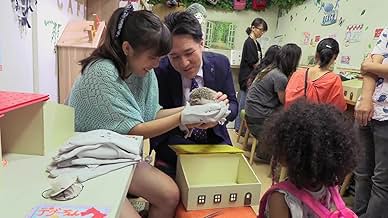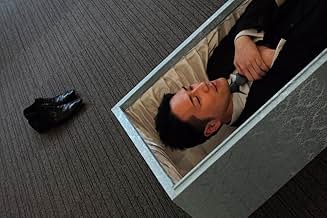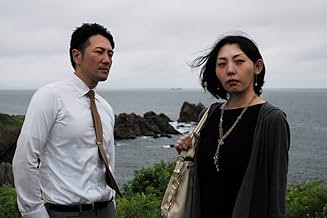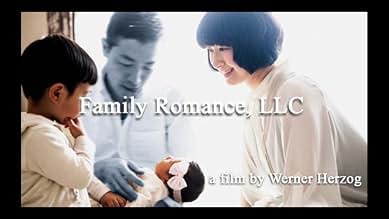AVALIAÇÃO DA IMDb
6,7/10
3,2 mil
SUA AVALIAÇÃO
Um homem é contratado para representar o pai desaparecido duma jovem.Um homem é contratado para representar o pai desaparecido duma jovem.Um homem é contratado para representar o pai desaparecido duma jovem.
- Prêmios
- 1 indicação no total
Yuichi Ishii
- Ishii Yuichi
- (as Ishii Yuichi)
Mahiro Tanimoto
- Mahiro
- (as Mahiro)
Avaliações em destaque
Yuichi Ishii runs a rental family service called Family Romance, offering clients the chance to hire people to act as their spouses, friends or family. He and his stable of actors fill the gaps in lonely people's lives. One day, Ishii is contracted to act as the father of a girl named Mahiro. The two become close, though Ishii begins to doubt his own reality, and his profession: to quote Werner Herzog: "the paradoxical situation is that although everything is performance, everything is a lie, everything is fabricated and acted, there is one thing always authentic, and that's emotions."
Herzog's 'Family Romance, LLC' is a moving drama, treading the line between feature film and documentary. Shot by Herzog himself, using a handheld camera, the film postulates that performance, artifice, is rife in society, that we are but, to paraphrase Shakespeare, "poor players strutting and fretting our hours upon the stage."
For many years, Herzog has spoken of "ecstatic truth," by which he means a storyteller, through fabrication, can reach a deeper, transcendent level of truth, going beyond mere factual accuracy. Essentially, it's a truth transcending the mundane, reaching into the mysterious, elusive realms of imagination and stylization. In other words, a lie that reveals truth, that is more authentic than reality itself. This is an undercurrent in 'Family Romance, LLC,' forming the foundation of Ishii and Mahiro's relationship.
To quote Herzog, "the girl lies to her 'father', who lies to be her father. She's lying to him as well, but her emotions for him are authentic." Weaves of ecstatic truth run throughout the tapestry of the film, as does the notion that we are all performers. This is heightened by the casting of Ishii as himself, as he, in reality, really runs a company called Family Romance, which actually provide the services mentioned above.
Throughout the film, Herzog invites viewers to question the veracity of our experiences, comparing us to robotic fish in a tank; endlessly swimming in an inescapable compound. Further, he highlights the loneliness of many in contemporary Japan, a land bustling with people where many feel isolated and alone.
According to CNN, "across Japan, nearly 1.5 million people have withdrawn from society, leading reclusive lives largely confined within the walls of their home... These are Japan's hikikomori, or shut-ins, defined by the government as people who have been isolated for at least six months." Japan faces an isolation crisis, and Herzog's film shows how Ishii's company breaks the dark spell of loneliness, how, in the words of Ishii, they "create illusions to make the lives of (their) clients better."
It makes for poignant drama. Watching young Mahiro form a relationship with a man she assumes to be her real father, and knowing that their relationship cannot last, is devastating. There is an improvisational, informal feeling to the film, so one really believes in their relationship, and is invested in their characters. While there are moments of humour throughout- such as when a mime performs a brilliant routine with a mobile phone- it is primarily a touching film, exposing deep truths, tugging at the heartstrings.
The film also shows other cases Ishii works on, such as a lottery winner who wants to re-experience the high of the win, or a man who wants someone else to take credit for a mistake he made at a train station. These are generally more comedic in tone, though no less believable, adding to Herzog's authentic depiction of life in Japan.
Herzog's handheld cinematography contributes to the film's realistic feeling. It is intimate, getting in close to the characters. Viewers feel like voyeurs, peeking into the lives of Ishii and Mahiro. At times, the visuals take on a dreamlike aspect, making Japan feel unreal, like a figment of the imagination. Ernst Reijseger's elegiac score adds to this feeling of unreality, complementing Herzog's imagery, while his and Sean Scannell's editing is astute. Reportedly, Herzog captured over 300 hours of film with Ishii; to cut it down to a coherent 90 minutes is an effort deserving applause.
As are the performances from the cast, all of whom are not primarily actors, and most of whom had not acted before, and have not done since. Yuichi Ishii, as a version of himself, is terrific. He has an inherent emotional intelligence and decency, which is evident on screen, making him a compelling character. Mahiro Tanimoto, playing Mahiro, is similarly excellent. A natural actress, she brings a vulnerability to the part that is most affecting, and is never anything less than believable. Her relationship with Ishii feels remarkably real, and they work wonderfully together. In addition, Miki Fujimaki does strong work as Mahiro's mother, and the rest of the amateur cast cannot be faulted.
Werner Herzog's 'Family Romance, LLC' blurs the line between fact and fiction, as his films often do. A touching, heartbreaking drama, it movingly examines human nature, loneliness and interpersonal relationships. It also ponders the meaning of truth, and how performance impacts our daily lives. Featuring striking cinematography and a powerful score, and led by two remarkably real performances from Yuichi Ishii and Mahiro Tanimoto, it is- much like its director- original, fascinating and unique.
Herzog's 'Family Romance, LLC' is a moving drama, treading the line between feature film and documentary. Shot by Herzog himself, using a handheld camera, the film postulates that performance, artifice, is rife in society, that we are but, to paraphrase Shakespeare, "poor players strutting and fretting our hours upon the stage."
For many years, Herzog has spoken of "ecstatic truth," by which he means a storyteller, through fabrication, can reach a deeper, transcendent level of truth, going beyond mere factual accuracy. Essentially, it's a truth transcending the mundane, reaching into the mysterious, elusive realms of imagination and stylization. In other words, a lie that reveals truth, that is more authentic than reality itself. This is an undercurrent in 'Family Romance, LLC,' forming the foundation of Ishii and Mahiro's relationship.
To quote Herzog, "the girl lies to her 'father', who lies to be her father. She's lying to him as well, but her emotions for him are authentic." Weaves of ecstatic truth run throughout the tapestry of the film, as does the notion that we are all performers. This is heightened by the casting of Ishii as himself, as he, in reality, really runs a company called Family Romance, which actually provide the services mentioned above.
Throughout the film, Herzog invites viewers to question the veracity of our experiences, comparing us to robotic fish in a tank; endlessly swimming in an inescapable compound. Further, he highlights the loneliness of many in contemporary Japan, a land bustling with people where many feel isolated and alone.
According to CNN, "across Japan, nearly 1.5 million people have withdrawn from society, leading reclusive lives largely confined within the walls of their home... These are Japan's hikikomori, or shut-ins, defined by the government as people who have been isolated for at least six months." Japan faces an isolation crisis, and Herzog's film shows how Ishii's company breaks the dark spell of loneliness, how, in the words of Ishii, they "create illusions to make the lives of (their) clients better."
It makes for poignant drama. Watching young Mahiro form a relationship with a man she assumes to be her real father, and knowing that their relationship cannot last, is devastating. There is an improvisational, informal feeling to the film, so one really believes in their relationship, and is invested in their characters. While there are moments of humour throughout- such as when a mime performs a brilliant routine with a mobile phone- it is primarily a touching film, exposing deep truths, tugging at the heartstrings.
The film also shows other cases Ishii works on, such as a lottery winner who wants to re-experience the high of the win, or a man who wants someone else to take credit for a mistake he made at a train station. These are generally more comedic in tone, though no less believable, adding to Herzog's authentic depiction of life in Japan.
Herzog's handheld cinematography contributes to the film's realistic feeling. It is intimate, getting in close to the characters. Viewers feel like voyeurs, peeking into the lives of Ishii and Mahiro. At times, the visuals take on a dreamlike aspect, making Japan feel unreal, like a figment of the imagination. Ernst Reijseger's elegiac score adds to this feeling of unreality, complementing Herzog's imagery, while his and Sean Scannell's editing is astute. Reportedly, Herzog captured over 300 hours of film with Ishii; to cut it down to a coherent 90 minutes is an effort deserving applause.
As are the performances from the cast, all of whom are not primarily actors, and most of whom had not acted before, and have not done since. Yuichi Ishii, as a version of himself, is terrific. He has an inherent emotional intelligence and decency, which is evident on screen, making him a compelling character. Mahiro Tanimoto, playing Mahiro, is similarly excellent. A natural actress, she brings a vulnerability to the part that is most affecting, and is never anything less than believable. Her relationship with Ishii feels remarkably real, and they work wonderfully together. In addition, Miki Fujimaki does strong work as Mahiro's mother, and the rest of the amateur cast cannot be faulted.
Werner Herzog's 'Family Romance, LLC' blurs the line between fact and fiction, as his films often do. A touching, heartbreaking drama, it movingly examines human nature, loneliness and interpersonal relationships. It also ponders the meaning of truth, and how performance impacts our daily lives. Featuring striking cinematography and a powerful score, and led by two remarkably real performances from Yuichi Ishii and Mahiro Tanimoto, it is- much like its director- original, fascinating and unique.
The Wind Phone is a phone booth in Japan which people use to hold conversations with their loved ones lost in the tsunami of 2011. Here Herzog puts a woman on a cliff facing the ocean and gives her a receiver. "Did you speak with someone dead?, they ask her after she hangs up. "No. I tried instead to reach someone alive", she answers and you immediately recognize your communication with the living is as one-way as this. The existential solitude of modern man is on focus in this fine drama telling the invented story of a very real company called Family Romance which rents out actors to fill the gaps in our interpersonal relations.
I wanted to like this movie. The story is great and asks some serious questions about how we "act" in our everyday lives. However, the movie is quite hard to watch with many incredibly awkward scenes. It also looks a bit homevideo-y and the script is a quite thin.
An opportunity to witness Herzog's perfectly refined, and yet somewhat awkward style. Whilst the movie isn't riveting in a classical sense, the slow and constant rhythm draws us in.
There is a constant, permeating tension throughout the movie between reality and imitation. I found myself questioning this paradigm on two levels: To what extent is this movie a documentary? To what extent do the characters realistically portray family members?
As for the first question, the lines are extremely blurry. A family renting industry is known to exist, and Yuichi Ishii (the actor) is known to be the founder of one such company. Ishii claims the relationships throughout the movie are based on reality, but the New Yorker claims him to be unreliable. Nevertheless, the question itself is important and creates an uneasy tension as it plays and forth in our heads.
Ishii is clearly the standout in a cast of amateur actors. His performance is sensitive, realistic and almost paradoxically satirical (at times). He carries the story through to an emotional climax that poses yet more questions.
Herzog consistently uses complex metaphors and strong symbolism and a lot of the spiritual discourse of the movie can be found outside its dialogue (perhaps the result of Herzog directing in a second language).
In conclusion, give it a watch. It's a beautiful introduction to Herzog and will leave you with more questions posed than answered.
There is a constant, permeating tension throughout the movie between reality and imitation. I found myself questioning this paradigm on two levels: To what extent is this movie a documentary? To what extent do the characters realistically portray family members?
As for the first question, the lines are extremely blurry. A family renting industry is known to exist, and Yuichi Ishii (the actor) is known to be the founder of one such company. Ishii claims the relationships throughout the movie are based on reality, but the New Yorker claims him to be unreliable. Nevertheless, the question itself is important and creates an uneasy tension as it plays and forth in our heads.
Ishii is clearly the standout in a cast of amateur actors. His performance is sensitive, realistic and almost paradoxically satirical (at times). He carries the story through to an emotional climax that poses yet more questions.
Herzog consistently uses complex metaphors and strong symbolism and a lot of the spiritual discourse of the movie can be found outside its dialogue (perhaps the result of Herzog directing in a second language).
In conclusion, give it a watch. It's a beautiful introduction to Herzog and will leave you with more questions posed than answered.
I'm gonna be brief here: everyone could have done a documentary about this topic. We're talking about a japanese agency specialized in renting substitutes for dead family members!
Herzog gives us coordinates and help us to ask the right questions to understand our apparently weird world. What is the role of the illusion? What connection does it have with the robotics and cinema? Is it totally evil?
There's no judgment in the director's eye. Only representation, critical look and, of course, illusion.
Você sabia?
- CuriosidadesThe scene filmed at the station where Ishii Yuichi is reprimanded was filmed in one shot and the team dispersed after filming because they were filming without permission and the Security Team was coming to arrest them.
- Versões alternativasThe MUBI streaming (internet) version adds an 5' introduction by Herzog, and a 16' post interview with him by MUBI's Daniel Kasman.
- ConexõesReferenced in Film Junk Podcast: Episode 758: Cloud Atlas (2020)
Principais escolhas
Faça login para avaliar e ver a lista de recomendações personalizadas
- How long is Family Romance, LLC?Fornecido pela Alexa
- What's the meaning of Ishii Yuichi's dream?
- What kind of camera was used for filming?
Detalhes
Bilheteria
- Faturamento bruto mundial
- US$ 3.126
- Tempo de duração1 hora 29 minutos
- Cor
Contribua para esta página
Sugerir uma alteração ou adicionar conteúdo ausente

Principal brecha
By what name was Uma História de Família (2019) officially released in India in English?
Responda



















